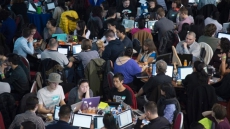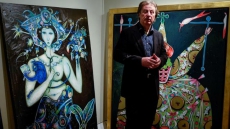A Like shouldn't always be taken literally, say tech experts, who are closely watching the case of 13 Dalhousie University students suspended for their actions on Facebook.
The case is interesting for many reasons, including the fact that it exposes how users often don't appreciate that nothing is truly private online, said Aimee Morrison, an associate chair in the English department at the University of Waterloo.
"We're in this moment with social media where people haven't quite modulated their behaviour in what is actually a pretty public space," said Morrison, who studies digital issues.
The 13 fourth-year dentistry students belonged to a school-related private Facebook group, which was set up when they met each other in 2011.
One of the students, Ryan Millet, has gone public to protest his suspension, claiming that he helped expose offensive posts in the group, including misogynistic comments about some female classmates.
Lawyer Bruce MacIntosh suggested at a recent press conference that his client, a father of three, didn't interact much with his fellow students outside of class and used the group to stay in touch.
"He also described what the Facebook group started out being and continued to be: they exchanged thoughts about dental things," MacIntosh said, adding that only a small percentage of the thousands of posts to the group over the years were offensive in nature.
Millet's lawyers say that he added a Facebook Like to a suggestive photo of a woman sitting on the steps of a public building with a sign tucked under her folded legs that reads "public entrance."
While not specifically referring to that photo, Morrison believes Dalhousie's administration does not truly understand the nuances behind how users behave on Facebook and are looking at the act of Liking a post too simplistically.
Leaving a Like on a post doesn't always mean that a person literally likes that content, Morrison said, especially when users feel social pressures to acknowledge friends' posts.
"These are kinds of (online) social norms of behaviour. It's the same as in real life when you meet somebody. There are some people you know you should shake their hand, some people you know they're going to want to hug you, and other people don't like to be touched. Some people you sit beside and some people you sit across from. These are negotiated patterns of interaction," Morrison said.
"If we were going to determine relative levels of culpability among people in this particular Facebook group we would have to understand what normal modes of behaviour there were ... does every comment get a Like? Are there people who just indiscriminately Like everything and that's just what they do everywhere on Facebook, or are there people who only Like stuff that they really agree with?
"I don't think we've done any real thinking about the norms of interaction in the Facebook space and I think it matters."
Young people especially often place a very high value on having their photos and comments Liked and know their friends also crave that validation, said Matthew Johnson, director of education for the non-profit organization MediaSmarts, which researches how kids and teens are growing up in today's digital age.
"Likes are strongly taken as a measure of popularity. There's often a lot of stress, for instance, when a photo is posted, over how many Likes it will receive," Johnson said.
"But young people do have to understand that when they're Liking something negative they are adding their own voice; they're essentially joining in."
He said the tenor of a group's discussions can encourage users to act more aggressively or with less empathy than they normally would face-to-face with another person.
"Particularly teenagers take a lot of cues from the values of the space that they're in — we behave the way we see other people behaving and ... so when we spend time in online environments we do take on the values of those spaces, at least when they're in them," Johnson said.
"When we're online we may not feel the same sort of checks on our behaviour that we feel when we're offline. A lot of the things that normally trigger empathy in us — things like a person's tone of voice, their body language, their expression — are absent when we're communicating online and so we may not feel empathy in situations where we normally would."
Morrison said it's likely there are different levels of culpability among the 13 members of the Dalhousie Facebook group and finding them all automatically guilty by association is too simplistic.
She can understand how it might have been difficult for Millet — or someone else in his situation — to leave the Facebook group upon first seeing posts that could be deemed offensive.
"It's always awkward to leave a group, especially if it's people you have to see every day," she said.
"If I was involved in a group with English professors at Waterloo and it's every professor in my department and then it gets kind of offensive, I would probably feel very awkward about leaving and being the only person to leave because ... you're making a pretty strong statement."
Morrison said young people in particular seem to have trouble grasping how damaging their online actions could be, whether it's a post, Like or otherwise.
"There's a lot of research now about how impulse control and consequence consideration does not really develop fully in human beings until the late 20s so you're not thinking when you put that post up of what's going to happen in 10 years," she said.
"But a lot of this has to do with the nature of social media itself and its relative newness and culture. Grownups and teenagers and youth alike have to figure this out."





